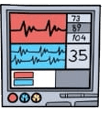World Skin Cancer Month

The most important points about World Skin Cancer Month:
- World Skin Cancer Month is held in May every year to raise awareness about this serious and common disease.
- Skin cancer is the most common type of cancer in the world, affecting more than 3 million people annually.
- There are three main types of skin cancer: basal cell carcinoma, squamous cell carcinoma, and melanoma.
- The most important methods of prevention are to prevent excessive exposure to ultraviolet (sun) rays, examine the skin periodically and look for any suspicious changes, and use sunscreen.
- Early detection of skin cancer greatly increases the chances of recovery, so it is important to perform a regular skin examination.
- During the month of May, many events and campaigns are organized to raise awareness of skin cancer and the importance of prevention and early detection.
The main symptoms of skin cancer
- The appearance of a new spot or growth on the skin
- Its color may be different from black (black, dark brown, red, blue)
- It may have unintentional or jagged edges
- It may affect its size or stretch over time
- A new bump or bump that grows quickly
- It may have an unusual formula
- It may be larger than 6 mm in diameter
- They may have different colors or internal temperature
- Changes in the pre-existing void
- Change in size or shape
- Its color changes or multiple colors appear
- crusting, bleeding, or ulceration
- The appearance of a scar or blister that does not heal
- It may be cancerous if it does not go away after a while
- If you notice any of these symptoms, it is important and your doctor starts treatment early if necessary
Ways to prevent skin cancer
- Sun protection
- Use a sunscreen with a high protection factor
- Avoid exposure to the sun during peak times (10 a.m. to 4 p.m.)
- Wear UV protective clothing
- Seek shade when outside
- Regular skin self-examination:
- Examine the skin every month to identify any changes in cells or spots
- Look for any new or changed spots or cells
- Periodic medical examination
- Do a complete skin examination with a dermatologist at least once a year
- Inform the doctor of any noticeable changes in the skin
- Avoid smoking
- Smoking increases the risk of some types of skin cancer
- Follow a healthy diet
- Eat foods rich in antioxidants, such as fruits and vegetables
By following these guidelines regularly, your risk of skin cancer can be significantly reduced

 Operation Theater
Operation Theater Intensive Care Units
Intensive Care Units Diagnostic & Imaging
Diagnostic & Imaging Hospital / Clinics Furniture
Hospital / Clinics Furniture Physiotherapy
Physiotherapy Specialties
Specialties Ambulance Equipment
Ambulance Equipment Mortuary Equipment
Mortuary Equipment

